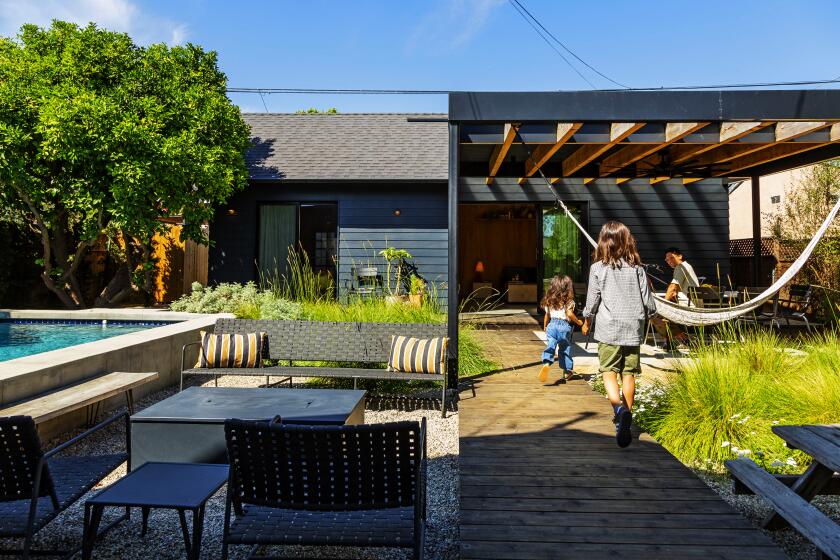City Council OKs 3-Story Condo Development in Newbury Park : Housing: The developer is told to reduce the project for low- and moderate-income residents to 26 units, bringing it into compliance with most codes.
- Share via
The Thousand Oaks City Council, attempting to provide affordable housing without violating design standards, has approved a dense condominium complex in Newbury Park but ordered the developer to lop off four of the 30 units proposed.
Removing four townhouses would bring the project into compliance with most city codes by eliminating the need for an tall retaining wall, freeing up space for a tot-lot play area, and reducing the number of guest parking spaces required.
But the three-story condos, to be built over an underground garage on the south side of Borchard Road near West Kelly Road, would still slightly exceed the city’s 25-foot building height limit.
The council’s 3-2 decision came close to midnight Tuesday, after a rowdy four-hour public hearing that featured more than a dozen residents condemning the project as an overcrowded eyesore.
But a half-dozen speakers urged the council to approve the project and support moderate-priced housing for young families.
Councilwomen Elois Zeanah and Jaime Zukowski voted against the development, arguing that the tiered structures would create an urban look inappropriate for the neighborhood and in violation of city architectural guidelines.
But Mayor Judy Lazar responded, “Not everyone wants to live in a single-family detached home, and not everyone can afford it.” In a slap at the dissenters, Lazar added: “It’s very easy to vote no, and a lot of people will make political hay out of voting no. I have always supported affordable housing and I don’t apologize for it.”
As the debate intensified, some of the 60-plus people who filled the council chambers began hooting at the politicians.
Councilman Frank Schillo ignited the uproar when he criticized the anonymous author of an anti-development leaflet for acting in an “irresponsible, cowardly and inflammatory” manner by implying that council members had made their decisions before hearing public testimony.
“We’re a very open city and we spend a lot of time listening and being upfront,” Schillo said, bringing on catcalls from the audience. “I don’t think it’s right to circulate an anonymous document. If you’re proud of it, please let us know who you are.”
While no one took responsibility for the unsigned manifesto, many speakers endorsed its contents, including resident Mike Dunn, who said the development “would cause a significant decline in the quality of life in Newbury Park.”
But equally passionate were those who spoke in favor of the project, on the grounds that Thousand Oaks needs more moderately priced housing for low- and moderate-income families.
“You cannot open up your arms to business without opening up your arms to places for their employees to live,” real estate broker Joan Young told the council.
The two- and three-bedroom apartments will be reserved for families with gross household earnings of no more than $38,700 a year for the six units designated as “low-income” and $58,000 a year for the others.
The city will require the condominiums to be owner-occupied, and will impose a resale restriction to keep them in the hands of low-to-moderate income families for the next 30 years.
Urging approval of the project, resident John Scarborough said: “It’s time we all took responsibility to provide our future generations with an opportunity for home ownership here in the Conejo Valley. Otherwise, we’ll lose our young adults and end up with a city of fuddy-duddy old elitists.”
Nuwest Development Corp., which appealed to the City Council after the Planning Commission rejected the project, agreed to scale down the complex by four units. But project manager Erik Pfahler said he was “not pleased” because the reduction of units would cut deeply into his company’s profits.
His colleague, David Schwartzman, said he was frustrated that Nuwest would have to return to the drawing board after working for two years on the project. “We’ve got to crunch some numbers,” he said.
More to Read
Sign up for Essential California
The most important California stories and recommendations in your inbox every morning.
You may occasionally receive promotional content from the Los Angeles Times.










